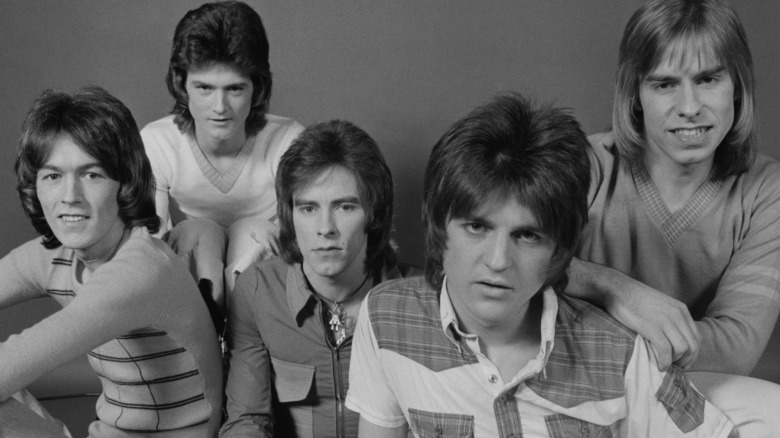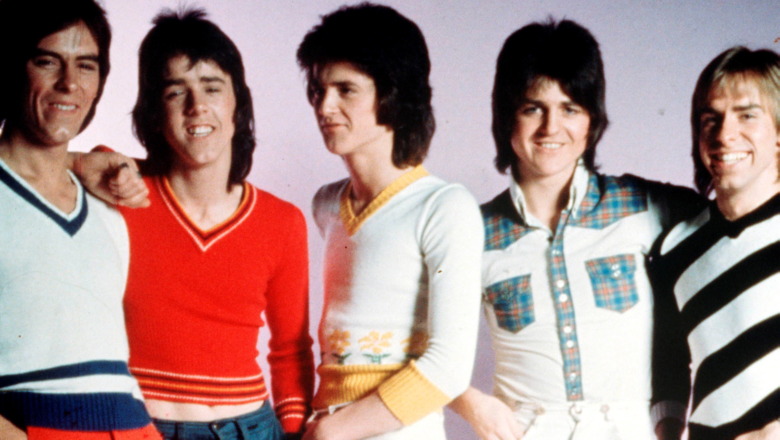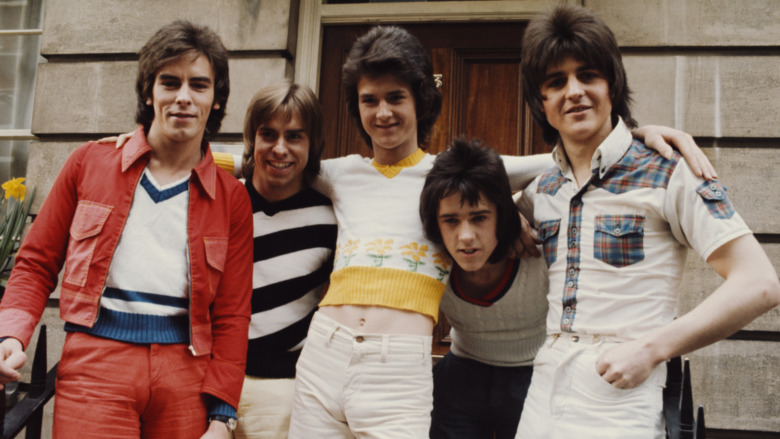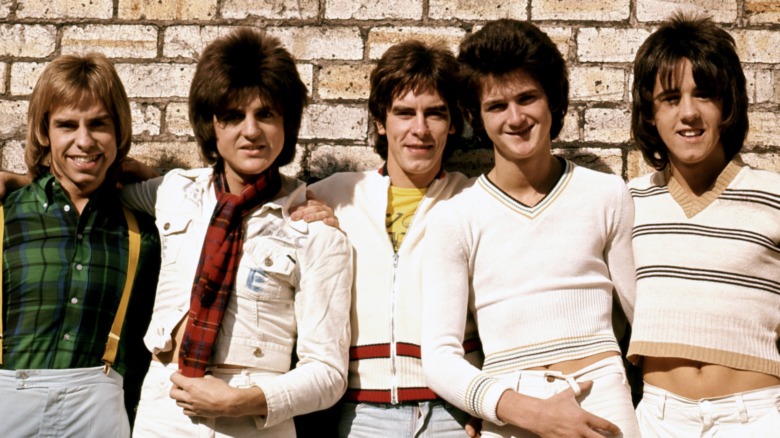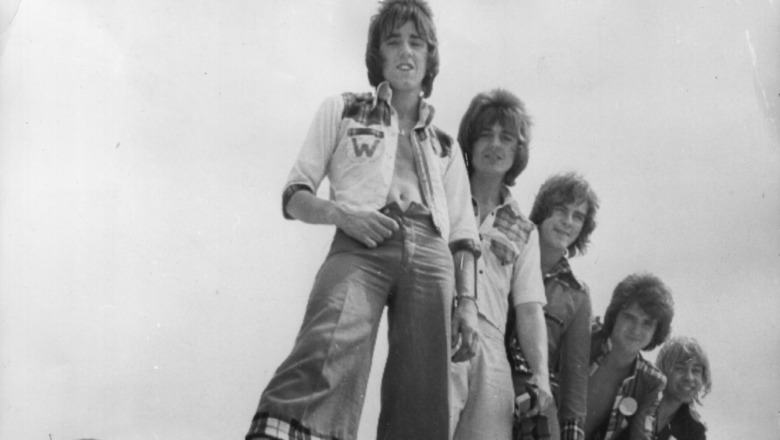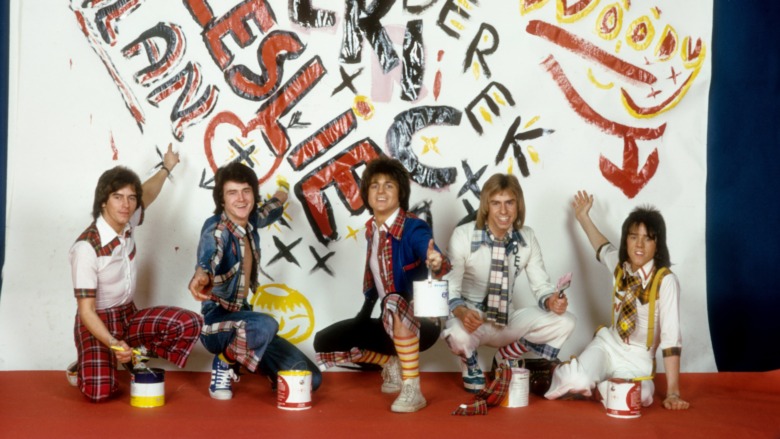The Untold Truth Of The Bay City Rollers
The Bay City Rollers, the Scottish teen pop band of the 1970s famous for their hits "Saturday Night" and "Money Honey," among others, lost a key member the week of April 20, 2021, when lead vocalist Les McKeown died, age 65. Though not an original member of the group, McKeown was with them during their 1970s heyday. And although he'd left the group decades earlier, he briefly rejoined them for a reunion tour in 2015, as The Daily Record reported.
Like a lot of bands that have been around in one form or another for several decades, the Bay City Rollers dealt with their share of adversity. Internal conflicts between members, and external conflicts with management, led to lineup changes and legal issues. Several members of the band, who have performed in various incarnations, have died. The group has also dealt with backlash from music critics who have failed to appreciate the group's signature sound.
This is the true story of the Bay City Rollers.
The Bay City Rollers started out as a garage band known as The Ambassadors
In the middle 1960s, teenage brothers Alan and Derek Longmuir joined up with a friend to form the Ambassadors, according to the book "When The Screaming Stops: The Dark History Of The Bay City Rollers." Save for a single performance at a wedding, the Ambassadors never went anywhere as a band. According to the book "Bay City Babylon: The Unbelievable But True Story of the Bay City Rollers," over the next few months the band changed names and lineups, with some individual band members moving to different instruments as well.
During this early period, the group, now known as The Saxons, was getting small gigs — weddings, or opening for other bands. Also during this time, the band members played mostly covers, including tunes by fellow Brits The Kinks. However, the group favored American songs, and along with their fondness for American music, decided an American-sounding name might do better for the nascent rockers.
The Scottish band chose the name of an American city
Having begun performing covers of American songs, the group, now known as "The Rollers," decided that they needed a more American-sounding name, according to "The Great Rock Discography." The band produced a map of the United States and some darts, the plan being to throw a dart at the map and add the name of the city where it landed to the front of the name.
The first dart landed on an unspecified Arkansas city, but the band wasn't satisfied ("The Little Rock Rollers" or "The Fort Smith Rollers" doesn't really have much ring to it). After another throw, the dart landed near Bay City, Michigan, and the rest, as the old saying goes, is history. The Bay City Rollers were born. A BBC News account of the band's naming gives a slightly different narrative, saying simply that the band "stuck a pin" in a map of the U.S. near the Michigan city, and the name of the group was born.
Regardless of the specifics, by 1971 the band had a new name and was on the cusp of worldwide success.
The Bay City Rollers: the first boy band?
The group's first hit was 1971's single "Keep on Dancing," according to BBC News. A few other singles followed; some charted, others did not. The band's breakthrough success came in 1974, with the releases of "Remember, "Shang-a-Lang," "Summerlove Sensation," and "All of Me Loves All of You," according to the book "British Hit Singles & Albums." Suddenly, the band found themselves phenomenally successful, particularly with one audience: teenage girls.
Music publicist Carol Strauss Klenfner visited Glasgow in 1975, and found the young lasses of the city swept up in "Rollermania." "It was just crazy, 12-year-olds and 14-year-olds all dressed up in Roller garb, with that look in their eye, of love. It was young love personified," she said.
Similarly, journalist Danny Fields described them as the first boy band. "They were adorable. Five cute guys at once. That's the story of rock n roll. The invention of boy bands became an industry thanks to the Bay City Rollers," he said.
The band's success brought a slew of problems
By 1976, the band's success was starting to be a mixed bag for the men who made up the group. Original member Alan Longmuir, now in his late 20s, wasn't satisfied with being in a "boy band" whose market was largely made up of adolescent girls, and decided to quit, according to "The Great Rock Discography." By the late 1970s, the group's popularity was waning, and the individual members were disagreeing about the musical direction the band should take, with some members keen to see the group create a less bubblegum pop sound in favor of more serious music. More personnel changes followed over the years, even as the band's singles reached lower and lower chart positions.
By 1980, having sold 120 million records, the Bay City Rollers were effectively over — except for the lawsuits. In 2007, according to The Scotsman, six men who had appeared in the group in its various lineups sued Arista Records for millions in unpaid royalties. Another former member, who had been with the group before they hit it big, threatened to sue those six for not including him in their suit. Then in 2010, two other former members did indeed sue the original six for excluding them from their lawsuit, according to The Hollywood Reporter.
Some music fans enthusiastically hate the Bay City Rollers
The Bay City Rollers were, among other things, a product of their time. They hit it big in the middle 1970s, slinging lighthearted and danceable music to teenagers while wearing tight pants and navel-revealing shirts and exuding boyish sex appeal. As such, they belong in the same category as other pop stars of the time, such as Leif Garrett and Shaun Cassidy.
That kind of music has traditionally failed to resonate with serious music critics, and in the case of the Edinburgh lads, has left a particularly bad taste in some mouths. For example, Dundee, Scotland record store owner Alastair "Breeks" Brodie spoke with The Courier about the most-hated British albums of all time, and expressed dismay that the Bay City Rollers weren't included. "You couldn't get all of the Bay City Roller albums [on the list]. They should definitely have been included though," he said.
Similarly, a BBC Radio 2 DJ steadfastly refused to play any Bay City Rollers music for several years, according to The Guardian, earning a formal complaint from a listener.
